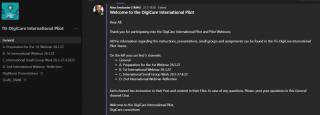The Work Package 3 (WP3) in DigiCare project is dedicated to piloting activities of the DigiCare model. Partner university teachers were trained on theoretic background of DigiCare model (e.g, professional communication, coaching, positive health) and they also did practical training sessions in order to learn and experience coaching from the roles of coachee and coach. Following teachers’ training the students’ theoretical education and practical training were organized. Students continued to train coaching and guidance using digital tools in real life clinical environment after their in-school-sessions were completed.
The final phase of WP3 pilots was International Pilot cycle which gathered nursing and healthcare students from all partner universities. Each university instructed their own students about the International Pilot activities and tasks. Students were enrolled into the TUNI TG-Teams where all the instructions were available.

The International Pilot was planned around two webinars. Instructions were given to each phase of the assignment. Between the webinars students contacted their multinational small group to agree on a schedule for coaching session. Each student were in the roles of coachee and coach.
What about the challenges?
Communication and contacting each other successfully proved to be a real challenge. Time perception among the students differed and goals & aims of the assignment varied among the students. Also, there was imparity in preparation for the coaching sessions and student orientation was not identical.
However, the core challenge was a fear to speak and use foreign language. How do we encourage students to overcome these challenges? How do we support the students who might have no exposure to foreign people or to use of foreign language?
What did we learn?
The above questions are difficult to tackle but honest and comprehensive reflection after the International Pilot identified areas of improvement and produced some ideas.
Preparation to international pilot assignments must be done carefully. The cooperation among foreign students must be assisted by providing it ample amount of time, encouragement and instructions as well as supporting students’ resilience to changing situations. Not to mention limiting the number of participants in the pilot to reasonable level. Over 100 participants was overly ambitious.
In addition to challenges and improvements, there were happy thoughts and feelings of achievement among participating students. While participating in the International Pilot, some students reached out of their comfort zones, assembled courage to use foreign language and got experiences traditional learning cannot provide.

Comments